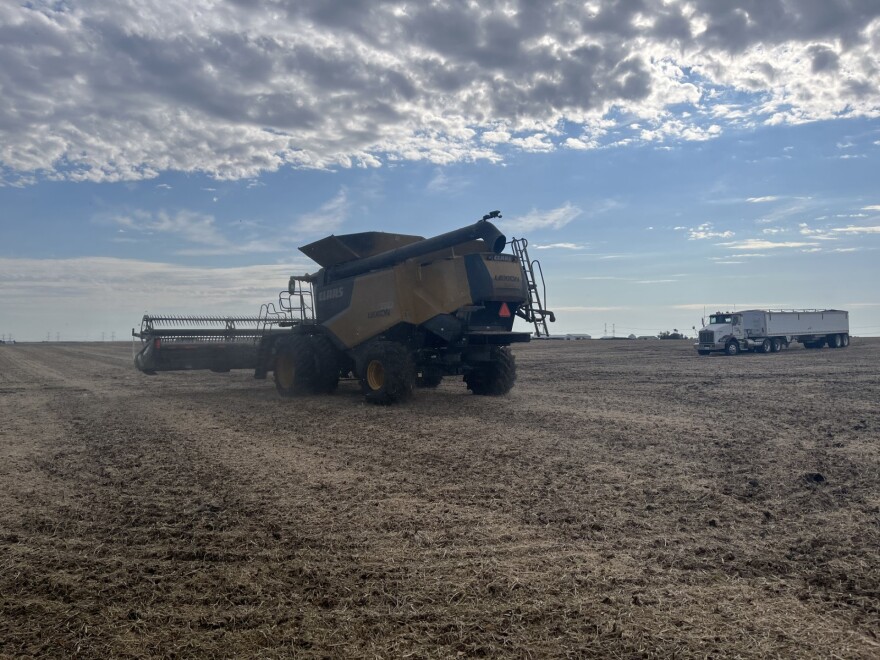The Federal Farm Bill of 2018 expired on Sept. 30, 2024. There was plenty of warning that the deadline was coming up.
Typically, farm bills expire and are renegotiated every five years. The 2018 bill received a year-long extension in 2023.
“We’ve seen, of course, with the overall economy right now, everybody’s pulled back on major purchases,” said Bob Benson, an Agriculture Lender at Morton Community Bank. Benson is also a farmer himself, tending a farm outside of Trivoli since 1995.
Even before the expiration of the bill, Benson says farmers were uncertain about investing in new equipment and land. High operating, or input, costs and low returns on crops meant the business landscape was already stressful.
“We haven’t felt the impact of some of the expiration of the farm bill,” Benson said. “But we will see that in 2025 if we don’t get a new bill in place.”

One program partially governed by the farm bill is crop insurance. While crop insurance wouldn't expire, the rules surrounding the program can change from year to year.
"Those things play an impact in our area locally and farmers are better able to plan from year to year when new crop insurance rules are written," said Charlie Hensley, manager of the Peoria County Farm Bureau.
“We need that safety net,” Benson said. “When you take a year where, we’ve seen in 2024, a dramatic drop in price on corn and soybeans, it can, we need that safety net and crop insurance to assure our decisions for the upcoming year.”
Those decisions can include anything from which purchases and upgrades to make, to how much to plant.
Andrew Larson, director of Government Relations for the Illinois Soybean Association, says the bill also provides support for foreign market exports.
“In Illinois, 60% of our soybeans in particular are exported every year,” he said. “So, we rely on robust, new and growing trade markets around the world to be able to send our ag commodities to. Of course, we know that the corn industry and the pork and beef industry also rely on that heavily.”

This isn't to say farmers and policymakers viewed the 2018 farm bill as perfect legislation. Benson says the bill's "base acres," average values for commodities used to calculate coverage for market loss, needed adjustments to account for modern inflation.
Larson is concerned about the increasingly likely outcome of another extension of the 2018 bill during December's lame duck congress.
“Continuing to kick the can and kick the can and not come up with new legislation that actually looks at what the needs of farm economy and agriculture are just prolongs any programs that aren’t working, or aren’t firing on all cylinders, working exactly right,” he said.
The impact of the farm bill's expiration could extend to some of the country's most vulnerable populations.
The Supplemental Nutrition Assistance Program, or SNAP, is both a large and controversial section of the Farm Bill. Multiple lawmakers have described it as a sticking point in negotiations. Some proposed drafts include billions of dollars in cuts.
Illinois Farm Bureau Associate Director of Food Systems Development Raghela Scavuzzo says other federally funded food assistance programs, like Farm to Food Bank, both fight food insecurity and help farmers get produce into their community's hands.

“These allow for diversification in revenue streams,” Scavuzzo said. “I think a lot of our farmers are seeing the opportunity to diversify, find new market opportunities. So as long as these programs can continue, it’s going to help the future of new opportunities versus some of the volatility in other aspects.”
Emergency food assistance programs did not expire in September along with the bill. According to Charlie Hensley, some got extended through the end of the year.
But programs like market access, foreign market development and trade promotion shut down immediately.
“There’s some important animal health programs that expired, things like specialty crop block grants programs expired,” Hensley said. “There are some important things that expired and that just shows how important it is that we get a new farm bill written as soon as possible.”
Farmers are busy enough with the harvest, but Bob Benson says there's a call to action for them to contact their congressmen and ask them to find some certainty for 2025.


